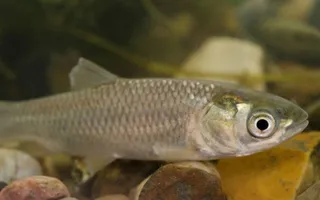It was Oscar Wilde who is said to have first exclaimed that there is no such thing as bad publicity. Therefore, when we were recently approached by BBC Countryfile who wanted to film and take an active part in a live fish rescue, we were naturally delighted to oblige.
Short of some disastrous accident ending the career of Helen Skelton, which I am relieved to say didn't happen, this was the perfect opportunity for fisheries to get its 15 minutes of fame.
You can watch the programme here
Fish as part of canal ecology
Over the past two or three decades fish have become much more recognised as being integral to the ecology of the nation's waterways. Fish are an important part of the food chain and birds such as kingfishers and herons as well as mammals such as otters are reliant on fish for their survival. It's often not appreciated that fish are expensive items to replace. It has been calculated that if all the Trust fish stocks were wiped out, it would cost £40 million to replace them all.
From time to time the Trust undertakes maintenance work required us to drain the water out of the canal or reservoir. Fish cannot live out of water for any length of time and therefore, if they were not rescued they would die. Even if left in shallow water for too long they can encounter problems: they can run out of dissolved oxygen; they can be killed by ice cover; disease and parasites can build up and the fish are at increased risk of being taken by predators. As all fish are protected by general law, and some rare species have extra protection, the Trust ensure that where required, fish rescues form part of all our works.
Fish rescue techniques
Contrary to myth, chasing fish around with a handnet is not an efficient way of ensuring their safety. In fact the reverse is true. The technique we use to rescue fish is called electrofishing. It involves passing an electric current through the water to temporary disengage the ability of fish to swim. They can then be easily netted. The rescued fish are then placed in large receptacles in clean fresh water and they recover after a few minutes before being rehomed in a section of canal that has a full water level.
Read a more in depth account of fish rescues
BBC Countryfile fish rescue
The fish rescue we undertook with the BBC Countryfile team was carried out on the Monmouthshire & Brecon Canal near Llangattock on 3 November. To ensure that the canal does not suffer slippage down the mountainside, the Trust are undertaking concrete lining of the canal bed.
Obviously this work needs to take place in the dry and so the water was drained and a fish recue undertaken, concurrently. We rescued a total of 280 lbs of fish, predominantly roach. Other species present were bream, gudgeon, eels, perch and stone loach. The rescues fish were all relocated to the nearest fully-watered section of canal.






